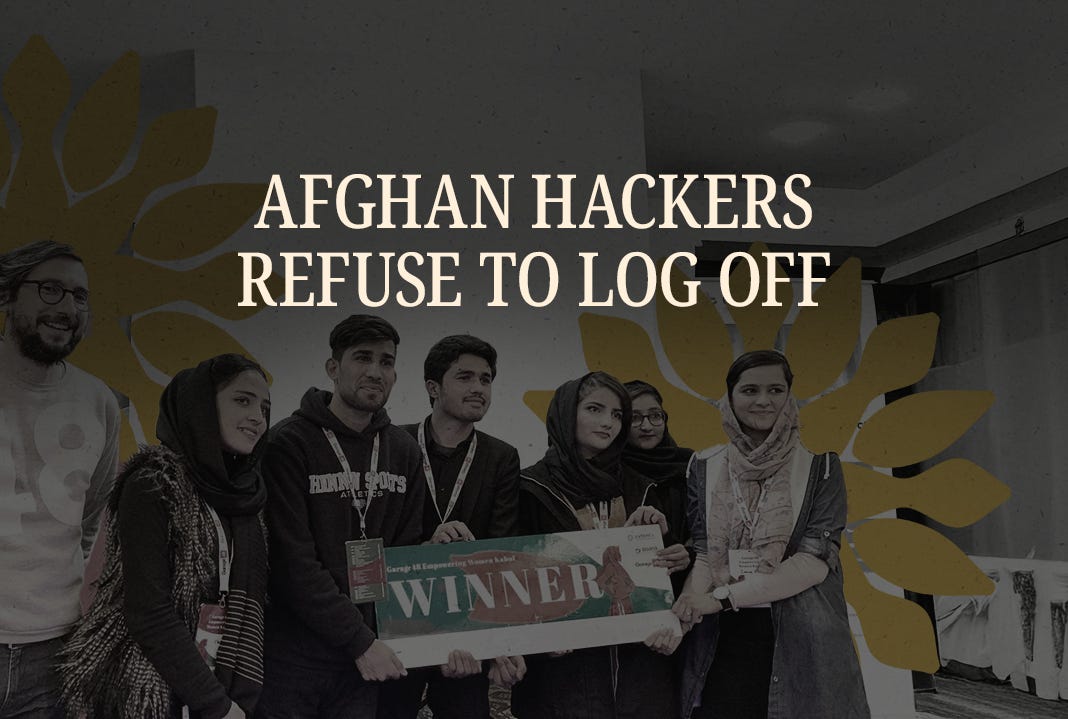Afghan Hackers Refuse to Log Off
After the Taliban takeover forced the closure of his startup, Afghan software developer Ahmad Zia Yousufi now works from exile to keep Afghan youth—especially women—connected to the digital world
When Afghan software developer Ahmad Zia Yousufi talks about hacking, he doesn’t mean breaking into systems. For him, hackathons—intense competitions where coders build solutions in 48 hours or less—are a way to test ideas and push boundaries.
“Hackathon is a hobby for me,” he said. “It’s fun, but it’s also about proving that Afghan talent can compete globally.”
Yousufi, now based in Germany, is part of a generation of young Afghans who tried to push their country into the digital age before the Taliban’s 2021 takeover. His journey, with its mix of entrepreneurial success and devastating setbacks, mirrors Afghanistan’s troubled relationship with technology and education.
Born in rural Kabul, Yousufi grew up in a household where education was a family affair, and meant pushing back against imposed limits regardless of the risks. His father ran dozens of schools across the country over his long period of public service, while his mother secretly taught girls at home during the Taliban’s first regime in the 1990s, backed by a Swedish aid group. They shared a deeply held belief that education is vital to societal wellbeing, and that men and women should have equal access to it.
“I have education in my DNA,” Yousufi said.
Those values shaped his path. He attended Kabul’s French-backed Istiqlal High School, immersed himself in science, and eventually earned degrees in civil engineering and computer science. But his ambitions extended far beyond textbooks.
In 2019, Yousufi launched Dastyar, a tech startup born out of a hackathon win sponsored by Estonia’s foreign ministry. Through Dastyar, Yusofi connected companies from outside Afghanistan to freelancers inside the country to outsource their technical tasks at a fixed rate. This concept was new at the time, but has since gained traction in Afghanistan, with competitors like YaganKar. Yusofi bridged the gap between companies that were in need of cheaper, efficient, and reliable talent and the young pool of Afghan designers, creatives, and developers who needed work.
Unfortunately, Dastyar’s collapse came quickly. First, COVID-19 slowed operations. Then, as the Taliban swept back to power in 2021, investors and clients fled. By the time the extremist group overran Kabul, the startup was gone.
“Starting a company is like raising a child,” he reflected. “Closing mine affected me deeply.”
Afghanistan’s digital freedoms shrank, too. Internet oversight hardened, censorship grew, and opportunities in the tech sector withered—especially for women. Today, fewer than 6% of Afghan women have online access.
Exiled in Germany, Yousufi found an opening in international hackathons. He competed in Paris, where he and his brother—who comes from a medical background—took home a championship title despite facing formidable competitors.
Together, the brothers founded Kick-Start, a nonprofit initiative aimed at training and mentoring aspiring software developers. Their mission: to give Afghans, especially women, access to skills and careers in the global tech industry.
In 2024, the project supported 80 Afghan girls in web development and UI/UX design, celebrated victories at international hackathons, and began expanding mentorship programs across borders.
“At Kick-Start, we believe that access to education and career opportunities in technology has the power to transform lives,” Yousufi said.
The contrast between Yousufi’s current work and conditions in Afghanistan is sobering. Since the Taliban’s return, more than 2.2 million girls have been barred from secondary school, over 100,000 women expelled from universities, and subjects like English and the arts stripped from boys’ curricula.
Yet Afghan youth press on. Underground schools, online classrooms, and groups like Kick-Start continue to operate in opposition to Taliban restrictions, offering a digital window to students locked out of formal education.
For Yousufi, hackathons remind him of what he and his fellow Afghans are capable of: “I don’t sleep for two or three days,” he said. “You have to build everything in front of judges and opponents. There are no shortcuts.”
What began as a childhood shaped by clandestine schools and family sacrifice has evolved into a career that blends coding with activism, carrying tangible risk. His determination, he insists, is not just about personal achievement:
“This is all about working hard, perseverance, and keeping your mindset on your goals,” he said. “If you can dream big and stay committed, you can change more than just your life—you can change your country.”
Middle East Uncovered is powered by Ideas Beyond Borders. The views expressed in Middle East Uncovered are those of the authors and do not necessarily reflect the views of Ideas Beyond Borders.




What tremendous purpose, commitment, and impact. Thank you.